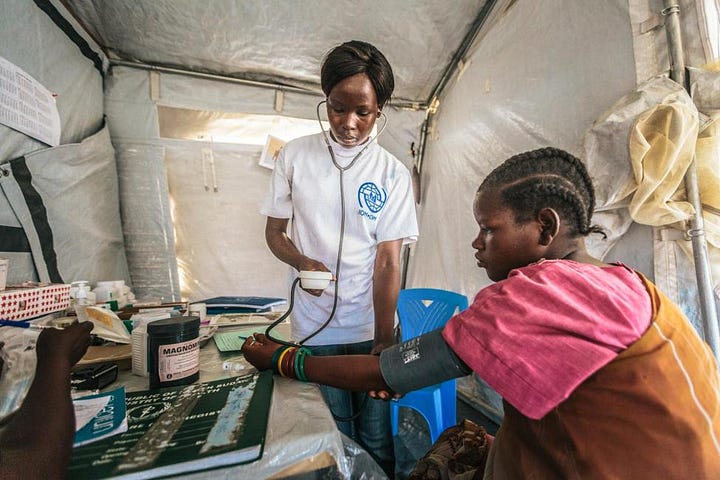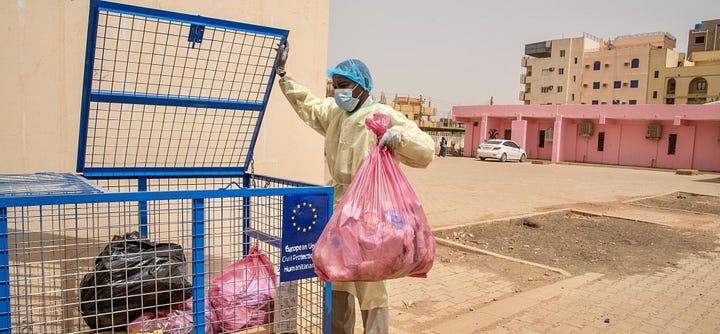Heavy gunfire erupts in South Sudan capital Juba
Fighting between soldiers and bodyguards of ex-security chief
Heavy and sustained gunfire erupted in South Sudan’s capital Juba on Thursday, sending shockwaves across the city after elements of the South Sudan People’s Defense Forces (SSPDF) reportedly acted on orders to transfer former security chief General Akol Koor Kuc to a detention center at the army headquarters in Bilpam.
The clashes began to unfold approximately 7:00 p.m. local time when a heavily armed SSPDF unit, traveling in seven pickup trucks, surrounded Akol’s residence near the Nimule Resort Hotel in the Thongpiny neighborhood.
Soldiers demanded Akol surrender himself, but his bodyguards, as well as elements of the elite Tiger Battalion presidential guard, which sided with him, refused. By 7:30 p.m., attempts to forcibly enter the residence escalated into heavy gunfire, shattering the evening calm in the capital and sparking widespread panic.
Akol has been under house arrest since his dismissal as director-general of the Internal Security Bureau (ISB) of the National Security Service in early October. He had headed the country’s repressive internal security organ for 13 years, and was a close ally of the president, until falling out with him earlier this year. Despite his removal from office, he still commands support within various security services.
The United Nations Mission in South Sudan (UNMISS) confirmed the clashes in a safety advisory to staff in Juba. The peacekeeping mission urged all personnel to “shelter in place” and avoid movement as tensions unfolded. UNMISS officials attributed the violence to an operation targeting Akol.
South Sudan seceded from Sudan in 2011 and the latest outbreak of violence in Juba is not directly related to the ongoing civil war in neighboring (north) Sudan. However, the countries share similar histories, governance problems, and common economic and security challenges. Conflicts in one country sometimes spill over into the other, and dissidents and refugees have often crossed from north to south and vice versa.
The outbreak of war in Sudan last year seriously damaged South Sudan’s economy, resulting in a deep government deficit. Civil servants and soldiers in South Sudan have not received their salaries for more than a year, raising tensions and the risk of mutinies, disputes, and defections.
However, the National Security Service and Presidential Guard continued receiving their salaries until last month. Their salaries were abruptly halted following the sacking of Akol Kur and the presidential guard commander, Gen. Bol Wek. Typically, these elite units consistently receive their salaries on time, even when other civil servants go unpaid. The unprecedented delay in payments may have angered these elite soldiers.
In the meantime, conspiracies and rumors have multiplied around the nation’s frail and aging ruler, Salva Kiir, who has a habit of frequently reshuffling his cabinet and sacking, reassigning, or reappointing close aides. His latest moves, sacking very close and long-trusted allies like Akol Kur and Bol Wek, suggest a fresh bout of paranoia. Last month, he appointed a chief administrator for his office on a Friday and dismissed him on Monday.
Meanwhile, the ousted security chief, despite being under house arrest, gathered around him a large force of bodyguards at his home in the capital.
Commenting on the latest events, exiled activist Wani Michael said, “It is not a doubt that General Akol has so many loyalists inside the security services and maybe other organized forces who believed in him and subscribe to him. So you cannot treat him like any other field commander.”
On the other hand, army spokesperson Major General Lul Ruai Koang sought to downplay the seriousness of the incident, attributing the violence to a misunderstanding between two security details stationed at Akol’s residence.
“Around 30 minutes ago, there was a shooting at the residence of ex-spy chief Gen. Akol Koor, involving our own forces deployed for extra security. A misunderstanding arose between the outer security force and the platoon providing close protection,” Lul told Sudans Post, confirming two servicemen were injured during the exchange.
He said the army’s Chief of Defense Forces, General Santino Deng Wol, intervened personally to halt the fighting. Lul declined to confirm whether Akol had been successfully arrested and transferred to Bilpam.
Conflicting reports have emerged regarding Akol’s whereabouts during the incident. While some speculate that he was successfully arrested and transferred to Bilpam, others suggest he may not have been at the residence when the fighting occurred. However, the latter scenario appears unlikely given that the violent confrontation itself would have had no justification if Akol had not been present.
The violent episode marks a dramatic escalation in the deteriorating relationship between Kiir and Akol, both of whom are ethnic Dinka from Warrap State, albeit from different counties. On October 2, 2024, Kiir dismissed Akol in absentia while the former security chief was on an unreported mission to the United Arab Emirates (UAE). Kiir initially appointed Akol as governor of Warrap State, his home region, but abruptly rescinded the appointment upon Akol’s return to Juba.
He was then put under house arrest and remained under that status arrest at his residence in Thongpiny, close to the U.S. Embassy and Juba Airport.
Akol, a prominent member of the Dinka ethnic group and a native of Tonj North County in Warrap State, had served as Director-General of the Internal Security Bureau (ISB) since South Sudan gained independence in 2011. During his tenure, the ISB, one of two main divisions within the NSS, became notorious for human rights abuses, including the targeting of political dissidents and opposition figures.
Under Akol’s leadership, the ISB overshadowed its counterpart, the General Intelligence Bureau (GIB), in both prominence and resources. While the GIB focuses on external threats, the ISB is tasked with monitoring and addressing domestic security issues, ranging from terrorism to political dissent. The agency has faced international criticism for its role in the 2017 abduction and extrajudicial killing of civil rights lawyer Dong Samuel Lual and opposition politician Aggrey Iddri, both of whom were registered refugees in Kenya.
The firefight at Akol’s residence has reignited fears in Juba, a city scarred by two previous outbreaks of large-scale violence, in December 2013 and July 2016, which killed thousands and sparked violence elsewhere in the country.
In December 2013, a political dispute between Kiir and then Former Vice President Riek Machar escalated into a civil war that left tens of thousands dead and displaced millions. Similarly, a fragile peace deal brokered in 2015 briefly brought Machar back to Juba, but clashes erupted again in July 2016 when fighting broke out between Kiir’s forces and Machar’s bodyguards at the presidential palace, known locally as J1.
The timing of Thursday’s incident added to the chaos in Juba. The gunfire erupted during the city’s busy evening hours when residents typically head out after work. Eyewitnesses reported abandoned vehicles near the Seventh Day Roundabout, one of the city’s busiest intersections that lies west of the scene of fighting, as people fled on foot to escape the violence.
Some residents sought refuge at the former United Nations Protection of Civilians (POC) site in Jebel, a neighborhood that has served as a sanctuary during previous conflicts. According to local reports, families arrived at the UN camp in significant numbers, fearing that the clashes could escalate into broader violence.
By Friday morning, calm had returned to the city, but the atmosphere remained tense, with a local community leader telling Sudan War Monitor that the situation was “cautiously calm” but noted lingering fear among residents.
The fighting has also highlighted the fragmented nature of South Sudan’s security apparatus. It is common for senior government and military officials to assemble personal protection forces composed of relatives and loyalists, rather than relying on units assigned by the state. Akol’s bodyguards, drawn from the Tiger Battalion, reflect this trend and underscore the challenges of maintaining centralized control over the South Sudan People’s Defense Forces (formerly called the SPLA).
Army spokesman Lul Ruai said an official investigation into the incident was to begin immediately, but its findings are unlikely to quell the growing tensions within the country’s political and security establishments. Yesterday’s confrontation has underscored the fragility of the country’s peace and the persistent risk of political rivalries escalating into violence.
Below: In this brief video, security vehicles are shown arriving at Akol's residence in Tongpiny, as civilians hurriedly flee in panic.
News in Brief
U.S. Secretary of State Antony Blinken spoke with his Emirati counterpart Abdullah bin Zayed al-Nahyan “about efforts to stop the fighting in Sudan, expand humanitarian access, and support a civilian political process,” according to Matthew Miller, the State Department spokesperson. They also discussed the conflicts in Gaza and Lebanon. The United Arab Emirates have supported the RSF.
The African Union said it will not reinstate Sudan’s membership as a result of the 2021 coup d'état by the current military government, which preceded the outbreak of civil war. “The AU’s position is constant: zero tolerance for unconstitutional coups,” Bankole Adeoye, Commissioner for Political Affairs, Peace and Security, told a news conference in Addis Ababa.
Journalist Mohamed Ahmed Nazaz was seriously injured in his legs when a shell exploded in the vicinity of the Grand Market in El Fasher earlier this month.
A cholera outbreak that began in Sudan has spread into the South Sudanese border town of Renk. The European Union says it provided €1 million to contain the outbreak through vaccinations, water treatment, and other services.


Lt Gen Abdel Fattah Al-Burhan delivered a speech rejecting any ceasefire talks.
Five civilians were killed and others were wounded, and some homes were burned, when airstrikes hit the town of Melit in North Darfur on Thursday evening, November 21, according to local sources.
Six civilians, including a woman and two children, were killed Thursday, Nov 21, when bombs landed at a water source in Kabkabiya, North Darfur and at the Al-Shati neighborhood school, which houses conflict-displaced people.


